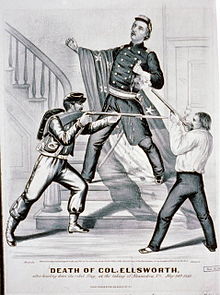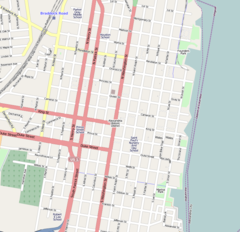Marshall House (Alexandria, Virginia): Difference between revisions
→History: add references |
→Artifacts: add information re. existing fragments of Marshall House flag |
||
| Line 111: | Line 111: | ||
==Artifacts== |
==Artifacts== |
||
Artifacts collected during the construction process of the Hotel Monaco were preserved by local archeologists. They may be seen in the [[Torpedo Factory Art Center]]'s third floor exhibit (the Alexandria Archaeology Museum), three blocks away on King Street. Architectural items from the Marshall House, a piece of the House's flag, and the “kepi” cap that Ellsworth wore when he died were on view at Alexandria’s [[Fort Ward (Virginia)#Fort Ward Museum|Fort Ward Museum and Historic Site]] during 2018. <ref name=sign/> The [[Smithsonian Institution]]'s [[National Museum of American History]] in Washington, D.C., holds in its collections a blood-stained piece of [[oilcloth]] |
Artifacts collected during the construction process of the Hotel Monaco were preserved by local archeologists. They may be seen in the [[Torpedo Factory Art Center]]'s third floor exhibit (the Alexandria Archaeology Museum), three blocks away on King Street. Architectural items from the Marshall House, a piece of the House's flag, and the “kepi” cap that Ellsworth wore when he died were on view at Alexandria’s [[Fort Ward (Virginia)#Fort Ward Museum|Fort Ward Museum and Historic Site]] during 2018. <ref name=sign/> The [[Smithsonian Institution]]'s [[National Museum of American History]] in Washington, D.C., holds in its collections a blood-stained piece of [[oilcloth]], a scrap of red [[Bunting (textile)|bunting]] that remain from the encounter at the Marshall House and a fragment of the flag.<ref>(1) [https://books.google.com/books?id=bCPbnsUPhB0C&&pg=PA292#v=onepage&q&f=false Goodheart, p. 292]<br>(2) {{cite web|archiveurl=https://web.archive.org/web/20020423220851/http://smithsonianlegacies.si.edu/objectdescription.cfm?ID=34|archivedate=2002-04-23|url=http://smithsonianlegacies.si.edu/objectdescription.cfm?ID=34|title=Fragment of Confederate flag cut down by Colonel Elmer Ephraim Ellsworth, 1861|publisher=[[Smithsonian Institution]]}}</ref> |
||
In addition, a fragment of the flag that Brownell gave to his mentor while on the way to Ellsworth's funeral was preserved by the mentor's family for many years. The fragment was sold during the 21st century.<ref>{{cite web|archiveurl=https://web.archive.org/web/20190128223513/https://www.raabcollection.com/american-history-autographs/ellsworth-flag|archivedate=2019-01-28|url=https://www.raabcollection.com/american-history-autographs/ellsworth-flag|title=A Fragment of the Original Confederate Flag Cut Down by Col. Elmer Ellsworth at the Marshall House, and For Which He Lost His Life: Along with a note and presentation envelope for the fragment from "Ellsworth's Avenger", Frank E. Brownell, which he gave to his mentor on the way to Ellsworth's funeral.|publisher=The Raab Collection|location=[[Ardmore, Pennsylvania]]|accessdate=2019-01-28}}</ref> |
|||
==See also== |
==See also== |
||
Revision as of 23:10, 28 January 2019
| Marshall House | |
|---|---|
 The Marshall House Inn (photo 1861) | |
| General information | |
| Type | Hotel |
| Address | 480 King Street |
| Town or city | Alexandria, Virginia |
| Country | United States |
| Coordinates | 38°48′16.90″N 77°2′40.45″W / 38.8046944°N 77.0445694°W |
| Demolished | 1950s |



The Marshall House was a hotel that stood at 480 King Street (near the corner of King Street and South Pitt Street) in Alexandria, Virginia. At the beginning of the American Civil War in 1861, the house was the site of the killing of Col. Elmer E. Ellsworth during the Union Army takeover of Alexandria. Ellsworth was a popular and highly prominent officer and a close friend of Abraham Lincoln. He was the first conspicuous casualty and the first officer killed in battle in the war. He was shot by the hotel proprietor James W. Jackson after removing a Confederate flag from the roof of the hotel, and Jackson was then killed immediately after he killed Ellsworth. Ellsworth's death became a cause célèbre for the Union, while Jackson's death became the same for the Confederacy.[1]
History
Ellsworth, founder of the 11th New York Volunteer Infantry Regiment known as the "Fire Zouaves", was killed at the Marshall House on May 24, 1861 (the day after Virginia's secession was ratified by referendum) during the Union take-over of Alexandria.[2] He was shot by the hotel proprietor James W. Jackson, who was then immediately killed by Corporal Francis E. Brownell, one of the four soldiers accompanying Ellsworth.[2] Ellsworth, a young Illinois lawyer and friend of the Lincolns, became the first Union officer to die in the Civil War.[3] Brownell later received the Medal of Honor for his action.
Ellsworth was killed as he descended the stairs of the hotel after removing a Confederate flag from its roof.[2] Jackson had raised the flag over the hotel, which was at a prominent location visible from the White House, and he had said the flag would only be taken down "over his dead body".[4]
Ellsworth's body was taken back across the Potomac to Washington, D.C. and was laid in state in the East Room at the White House.[5] Immediately after the incident, thousands of Union supporters rallied around Ellsworth's cause and enlisted, and "Remember Ellsworth" became a patriotic slogan. The 44th New York Volunteer Infantry Regiment called itself the "Ellsworth Avengers"[5] as well as "The People's Ellsworth Regiment".
Souvenir hunters carried away bits of the hotel as mementos, especially including portions of the stairway.[6] After the war ended, the Marshall House served as a location for a series of small businesses, but still attracted tourists from both the North and the South. Largely reconstructed after an 1873 fire that an arsonist caused, the building was torn down around 1950.[7]
The City of Alexandria has erected a wayfaring sign near the southwest corner of King Street and South Pitt Street. The sign relates the history and significance of the Marshall House, together with historical photographs and other information.[1]
Historical marker
In 1999, sociologist and historian James W. Loewen noted in his book Lies Across America that the Sons of Confederate Veterans had placed a bronze plaque on the side of a Holiday Inn that had been constructed on the former site of the Marshall House. Loewen reported that the plaque described Jackson's death but omitted any mention of Ellsworth.[8] Adam Goodheart further discussed the incident and the plaque (which was then on an outside wall of a Hotel Monaco) in his 2011 book 1861: The Civil War Awakening.[9]
The plaque called Jackson the "first martyr to the cause of Southern Independence" and said he "was killed by federal soldiers while defending his property and personal rights ... in defence of his home and the sacred soil of his native state".[10] In full, it read:
THE MARSHALL HOUSE
stood upon this site, and within the building
on the early morning of May 24,
JAMES W. JACKSON
was killed by federal soldiers while defending his property and
personal rights as stated in the verdict of the coroners jury.
He was
the first martyr to the cause of Southern Independence.
The justice of history does not permit his name to be forgotten.
–––––––––––––––– O –––––––––––––––
Not in the excitement of battle, but coolly and for a great principle,
he laid down his life, an example to all, in defence of his home and
the sacred soil of his native state.
VIRGINIA
In 2013, WTOP reported that some Alexandria residents were advocating the removal of the plaque, but that city officials had no control over the matter as the plaque was on private property.[11] However, in December 2016, Marriott International purchased The Monaco, added it to its boutique Autograph Collection and renamed it as "The Alexandrian".[12]
By October 2017, Marriott had removed the plaque from The Alexandrian and had given it to the local chapter of the United Daughters of the Confederacy. Responders to a report of the removal urged a boycott of Marriott or the placement of a plaque that discussed the deaths of both Ellsworth and Jackson.[13]
Artifacts
Artifacts collected during the construction process of the Hotel Monaco were preserved by local archeologists. They may be seen in the Torpedo Factory Art Center's third floor exhibit (the Alexandria Archaeology Museum), three blocks away on King Street. Architectural items from the Marshall House, a piece of the House's flag, and the “kepi” cap that Ellsworth wore when he died were on view at Alexandria’s Fort Ward Museum and Historic Site during 2018. [1] The Smithsonian Institution's National Museum of American History in Washington, D.C., holds in its collections a blood-stained piece of oilcloth, a scrap of red bunting that remain from the encounter at the Marshall House and a fragment of the flag.[14]
In addition, a fragment of the flag that Brownell gave to his mentor while on the way to Ellsworth's funeral was preserved by the mentor's family for many years. The fragment was sold during the 21st century.[15]
See also
Notes
- ^ a b c "Wayfinding: Marshall House". City of Alexandria, Virginia. 2018-03-28. Archived from the original on 2019-01-26. Retrieved 2019-01-26.
- ^ a b c (1) "The Murder of Colonel Ellsworth". Harper's Weekly. 5 (232): 357–358. 1861-06-08. Retrieved 2019-01-28 – via Internet Archive.
(2) "The Murder of Ellsworth". Harper's Weekly. 5 (233): 369. 1861-06-15. Retrieved 2019-01-28 – via Internet Archive. - ^ "Encounter at the Marshall House". Georgia's Blue and Gray Trail Presents America's Civil War. Georgia's Historic High Country Travel Association, the State of Georgia and Golden Ink. Archived from the original on 2018-01-01. Retrieved 2019-01-27.
- ^ (1) Prats, J. J. (ed.). ""Alexandria: Alexandria in the Civil War" marker". HMdb: The Historical Marker Database. Archived from the original on 2019-01-26. Retrieved 2019-01-26.
(2) Fuchs, Tom (2006-02-23). ""Alexandria: Alexandria in the Civil War" marker" (photograph). HMdb: The Historical Marker Database. Retrieved 2019-01-26. Archived 2019-01-26 at the Wayback Machine - ^ a b Goodheart, pp. 288-289.
- ^ Martha M. Boltz (2011-05-18). "Jackson and Ellsworth: Death on both sides of the Civil War". The Washington Times.
- ^ Bertsch, Amy (2016-09-29). "A Civil War landmark destroyed by fire" (PDF). Alexandria Times: Out of the Attic. Office of Historic Alexandria: City of Alexandria, Virginia. Archived from the original (PDF) on 2019-01-26. Retrieved 2019-01-26.
- ^ Loewen, James W. (2000). The Clash of the Martyrs: Virginia: Alexandria. New York: Simon & Schuster. pp. 294–295. ISBN 9781595586766. LCCN 99014212. OCLC 892054466. Retrieved 2019-01-26 – via Google Books.
{{cite book}}:|work=ignored (help) - ^ Goodheart
- ^ (1) Goodheart, p. 292.
(2) Pfingsten, Bill (ed.). ""The Marshall House" marker". HMdb: The Historical Marker Database. Retrieved 2019-01-26. Archived 2019-01-26 at the Wayback Machine
(3) Groeling, Meg (2017-10-23). "Colonel Elmer Ellsworth and the Marshall House Hotel Plaque". Emerging Civil War: Battlefield Markers & Monuments. Archived from the original (blog) on 2019-01-25. Retrieved 2019-01-25 – via WordPress. - ^ wtopstaff (2013-02-02). "Curious plaque tells forgotten story". WTOP. Retrieved 2019-01-26. Archived 2019-01-26 at the Wayback Machine
- ^ Barton, Mary Ann (2016-12-14). "Hotel Monaco Sold, to Become The Alexandrian". Patch: Old Town Alexandria. Patch Media. Archived from the original on 2019-01-26. Retrieved 2019-01-26.
As of Dec. 20, a boutique division of Marriott will manage Hotel Monaco and Morrison House in Alexandria, after sale of properties.
} - ^ October 2017 responses in Groeling, Meg (2017-10-23). "Colonel Elmer Ellsworth and the Marshall House Hotel Plaque". Emerging Civil War: Battlefield Markers & Monuments. Archived from the original (blog) on 2019-01-25. Retrieved 2019-01-25 – via WordPress.
- ^ (1) Goodheart, p. 292
(2) "Fragment of Confederate flag cut down by Colonel Elmer Ephraim Ellsworth, 1861". Smithsonian Institution. Archived from the original on 2002-04-23. - ^ "A Fragment of the Original Confederate Flag Cut Down by Col. Elmer Ellsworth at the Marshall House, and For Which He Lost His Life: Along with a note and presentation envelope for the fragment from "Ellsworth's Avenger", Frank E. Brownell, which he gave to his mentor on the way to Ellsworth's funeral". Ardmore, Pennsylvania: The Raab Collection. Archived from the original on 2019-01-28. Retrieved 2019-01-28.
References
Goodheart, Adam (2012). 1861: The Civil War Awakening. New York: Vintage Books, a division of Random House, Inc. ISBN 9781400032198. LCCN 2010051326. OCLC 973512612. Retrieved 2019-01-25 – via Google Books.
External links
![]() Media related to Marshall House, Alexandria Virginia at Wikimedia Commons
Media related to Marshall House, Alexandria Virginia at Wikimedia Commons

